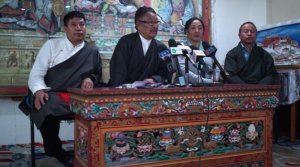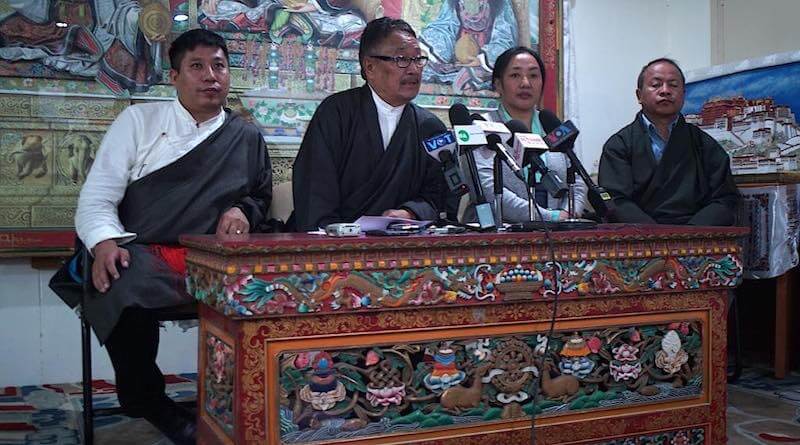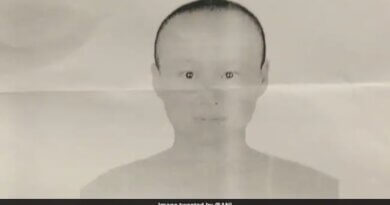Can the defendant in Case No. 20 lose gracefully?

By Tenzin Sangmo | 17 October 2019
The Tibetan Supreme Justice Commission’s verdict in case No. 20 issued on Monday was much awaited as it could put to rest the endless speculation over key issues in the high-profile defamatory case.
When the court ruled in favour of the plaintiff on Monday, the defendant lawyer and the acting President didn’t just express disappointment but insinuated that it was an unfair verdict, a reaction that clearly doesn’t help advance peace and public tranquillity it claimed to prioritize.
Such responses only fuel the sense of the current Tibetan cabinet’s misuse of power.
At the press conference held after the verdict, the maligning continued with the defendant lawyer repeatedly emphasizing the plaintiff’s act of taking the Kashag (Tibetan cabinet) to the court and its impact on its honour.
The plaintiff acknowledged that the victory in the case is no cause for celebration as the other party happened to be the Kashag, which he said he was forced to take to the court after being maligned and cornered.
He spoke of the need for measures to prevent such compulsion in the future and for everyone to move on now.
The plaintiff had also clearly laid out from the beginning that he shall accept whatever the outcome of the case is, despite having much to lose. This pronouncement can be seen as an act of respect for the court of the exile government, the judiciary.
The defendant’s reaction here contradicts its own statement in the last hearing that it wouldn’t demand any remedial measure from the plaintiff in case of the former’s victory for the sake of maintaining unity and public order.
The Home Kalon Sonam Topgyal Khorlatsang went as far as to say that the verdict doesn’t reflect the work of karma abiding people behind it, referring to the categorical victory of the plaintiff on all ten issues framed in the case.
Such polemics don’t say anything about the unfairness of the verdict and instead makes the defendant team appear arrogant about its convictions and lack of confidence in the exactitude of the publicly fought case.
The defendant lawyer fumed about the retrospective dismissal of Dhardon Sharling as a prime witness in the verdict. But again, he could have and may still enumerate on how it was unfair in order to inform the public rather than make sweeping statements.
Talking of the honour or dignity of the Kashag, shouldn’t the executive body, as one of the pillars of “democracy,” honour the judgment of the judiciary? Why can’t Kashag be taken to the court and proven wrong if it is indeed a democracy and democratically elected leaders exercising accountability?
It can be said that the case enhanced the principles of democracy in exile, by exercising equality before the law in practice.
The defendant, on many occasions had smugly correlated the process of the plaintiff’s termination from the Office of Tibet, Washington to his appointment, claiming a moral high ground by implying that it has His Holiness’ blessing in doing so since it is believed that His Holiness had a hand in appointment of the former Speaker to the Office of Tibet, Washington DC, instead of Brussels as the Kashag had planned.
However, it was established early on in the case that the Kashag’s prerogative to terminate the representative from the office is not being contested and that the case and the court only dealt with whether the plaintiff’s image was irreparably maligned by written and verbal accusations following the termination.
The court in its 1028 pages long case file had documented the minutes of the case. The defendant should spell out where and how the verdict was skewed and as we know, platforms are aplenty for such announcements.
The defendant lawyer, in post-verdict interaction with media, reiterated an earlier statement that Sikyong Dr Lobsang Sangay is too busy and has no time to bother about minor things like this.
Having accused the plaintiff throughout the hearing that the case has disrupted public peace, not having time for the case or to address its implication especially after the verdict indicates indifference for public peace and as a defamatory case that questions the defendant’s integrity, it also denotes disregard for integrity and accountability.
Can’t the defendant, Dr Lobsang Sangay led 15th Kashag of CTA, for once admit its mistakes, now attested by the exile Tibetan court?
Even His Holiness hasn’t shied away from issuing an apology in recent times in the name of peace and tranquillity, despite apparent elements of misinterpretation in the incident.
Is the current head of CTA, exercising secular power after the devolvement of the temporal role by His Holiness in 2011, claiming to be infallible?
It can only be hoped that the Tibetan public moves on and rises above regional and political affiliations in its reception of the verdict and not be swept into a perpetual squabble.
Tenzin Sangmo is a reporter at Phayul.com and a graduate of Columbia Journalism School.
The views expressed in this article are that of the author’s and should not be attributed to Tibet Express.





